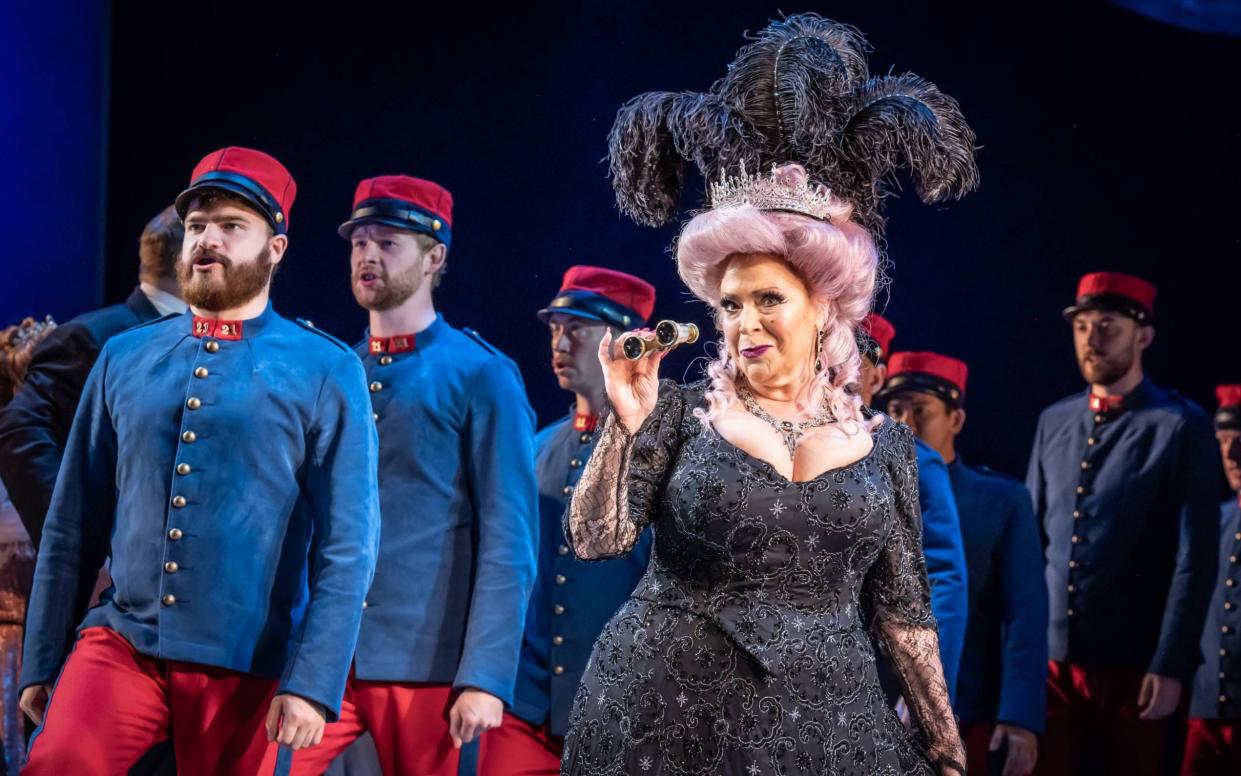The Daughter of the Regiment, Grange Park Opera, review: a production of unbridled joy

There it was again: a titter ripples through the audience. It’s followed by a guffaw, a chuckle and an actual belly laugh – were people genuinely having fun at the opera? It’s a truth universally known, if not acknowledged, that even opéra comique isn’t guaranteed to be amusing. But Grange Park Opera’s new production of Donizetti’s The Daughter of the Regiment eschews slapstick and gimmicks and instead focuses on the opera’s strength – the glittering score.
In the first Act, the eponymous character is almost a trouser role. As Marie, the foundling brought up by soldiers as an army mascot, Julia Sitkovetsky adopts a selection of power stances to rival Donald Trump (our politicians might want to take notes). There’s man-spreading and gun-slinging as she sings the regiment’s anthem. By contrast, her “fathers” – the 21st Regiment under Sergeant Sulpice (baritone Enrico Marabelli) – march lightly, delicately, crouching in sync. It’s more Gilbert and Sullivan than Donizetti yet somehow it works. Snare-drum rolls, horn fanfares and off-stage entries create this barrack-based setting.
The lighting is red, white and blue, the colour is blocked – we’re in 19th-century France. These are the few bright splashes against the vast wooden backdrop used in the first half; the crates stacked near the front of the stage are the only furniture. The stripe on the soldiers’ trousers picks out the newly transformed theatre, its previously light interior now a deep ruby, a task undertaken personally by Grange Park founder Wasfi Kani and her painting-the-roses-red team.
There are no surtitles for this English version – and, remarkably, almost every word could be heard. It’s carried by Sitkovetsky’s clear diction; her creamy coloratura soprano enhanced in duet with tenor Nico Darmanin, who, as Tonio, climbs the Everestian nine high Cs in “Ah! mes amis, quel jour de fête!”. The set in Act II is simple rather than sparse, the move to the chateaux represented by an over-sized chandelier, piano and music stand. Sitkovetsky, now in a white dress and ribbons, undergoes her Princess Diaries transformation, which naturally includes music lessons. It’s surprisingly difficult to sing badly as a professional singer and Sitkovetsky hits a comedic beat, shifting in-and-out of tune to a pitch-perfect “Queen of the Night” reference.
The backstory to Marie’s arrival at the regiment is glossed over; we glean that she was discovered on the battlefield as a baby, eventually it is revealed that the Marquise of Berkenfield (Anna Steiger) – responsible for Marie’s finishing lessons – is her mother. The darker underbelly to the story – the ubiquity of abandoned children in Donizetti’s era – is not explored. Like the Cabbage Patch Kids, the 1970s dolls that told the story of babies discovered in a field, the focus is on the find.
Grange Park Opera’s Gascoigne Orchestra – the ensemble takes its name from the organisation’s founding patrons – sprinkles sparkle among the salutes. We’re tapping our feet along to Sitkovetsky’s solos; swaying to the waltz. “What a joy,” sings Tonio. What joy indeed.
Until July 6; grangeparkopera.co.uk

 Yahoo News
Yahoo News 
